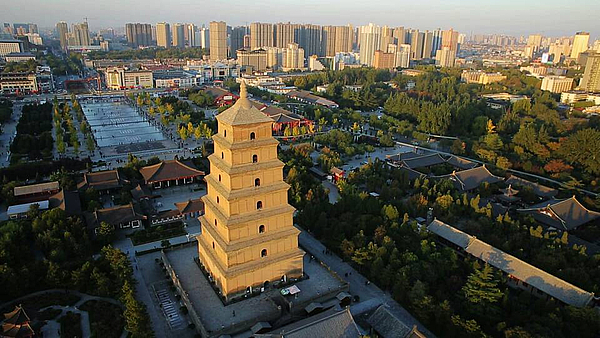Profile of Xi'an

Xi'an, which was called Chang'an in ancient times, is the capital city of China's Shaanxi province and the largest designated central city in Northwest China. It exercises jurisdiction over 11 districts and two counties, including the districts of Xincheng, Beilin, Lianhu, Yanta, Baqiao, Weiyang, Yanliang, Lintong, Chang'an,Huyi, and Gaoling, and the counties of Lantian and Zhouzhi. In addition, it is home to the National Xi'an Hi-tech Industries Development Zone, National Xi'an Economic and Technological Development Zone, Xi'an Qujiang New Zone, Xi'an Chanba Ecological Zone, Xi'an Yanliang National Aviation Hi-tech Industrial Base, Xi'an National Civil Space Industry Base, Xi'an International Port, Xi'an Fengdong New Town Zone , and Xi'an Fengxi New Town Zone. The total area of Xi'an is 10,752 square kilometers, and its population is 12.95 million.
Located in the middle of the Guanzhong Plain, Xi'an is one of the three international metropolises and the 9th Regional Central City of China designated by China's central government. It has earned the honorary titles of National Sanitary City, National Garden City, China City with Best Images, China City with Best International Images, and China's Civilized City. Remarkably, it has been named China Happiest City seven years in a row.
Xi'an has five distinguishing features:
First, Xi'an was the ancient capital of China and a cradle of civilization together with Athens, Cairo and Rome. It was the starting point of the ancient Silk Road. As a famous historical cultural city, Xi'an boasts the world’s richest cultural heritage and the most complete preservation of the ancient city and moat system. With more than 7,000 years of civilization, more than 3,100 years of city building and over 1,100 years of capital establishment, Xi'an can justly be called an "Open Air Historical Museum"; and indeed it has a total of 126 museums. The Qin Shihuang Mausoleum Terracotta Warriors and Horses, Big Wild Goose Pagoda, Little Wild Goose Pagoda, Tang Chang'an City Daming Palace Site, Han Chang'an City Weiyang Palace Site, and Xingjiao Temple Pagoda have all been inscribed in the World Heritage List.
Second, Xi'an is a highland of science and education, as well as a key post of military industry. The comprehensive strength of science and education ranks third in the country, with 63 universities and colleges, seven military academies, 43 graduate training institutes, 62 academicians of the "Two Academies" (of sciences and engineering) and 95 scientific research institutes. It has been rated as “China's leading smart city” and one of “the country's top ten innovative cities". Xi'an is second only to Beijing in basic strength of defense science and technology, with 44 military units and 207 investment and management units. In 2017, 400 enterprises joined the military industry, and the business income of the civil-military integration industry exceeded 200 billion yuan. That industry had gathered more than 1/3 of the domestic aerospace, weaponry and nearly 1/4 of the aeronautical research institutes, professionals and production forces. In September 2015, Xi'an was approved as a National Comprehensive Innovation and Reform Pilot Zone, and the Xi'an High-tech Industries Development Zone was approved as a National Independent Innovation Demonstration Zone.
Third, the industry base is complete and strong. It boasts electronics, machinery, chemicals, materials, surveying, automatic controls, aerospace, aviation and other fields at a first-class and world-leading level. Xi'an is building a "3+1" trillion-level industrial cluster around advanced manufacturing, high-tech industry, modern service industry and cultural tourism industry, and a “global metropolis of hard science and technology” around "eight pillar forces" of hard science and technology such as aerospace, optoelectronic chips, new energy, new materials, intelligent manufacturing, information technology, life science and artificial intelligence. In 2017, Samsung Phase II, Geely, Kevo, China Resources, Overseas Chinese Town, Alibaba, Tencent and Amazon signed contracts for a large number of major projects involving 44 Fortune 500 enterprises from around the world, with an additional investment of over 10 billion yuan in 40 projects. The establishment of Xi’an as a “Made in China 2025” pilot demonstration city has been approved through national evaluation. The national general aviation industry comprehensive demonstration zone has also been endorsed.
Fourth, Xi’an is a transport hub and open frontier. It is an important fulcrum city on the Belt and Road, and the central city in the west of the China section of the New Eurasian Continental Bridge. It is located in the geometrical center of China and is the national geodetic origin. Xi'an's Xianyang International Airport, its railways and highways are one of the six hubs in China, and its international land port is the only inland port with National and International double codes. With the establishment of the China (Shaanxi) Free Trade Pilot Zone the Xi’an Comprehensive Bonded Zone, Xi’an High-tech Comprehensive Bonded Zone, Xi'an Export Processing Zone A Zone B and other special customs supervision areas have become new highlights and growth poles of the open economy. In 2017, the first Nordic (Xi'an-Kovora, Finland) international freight train route was opened, and has carried 480 runs of the "Chang'an", carrying 659,000 tons of cargo. In 2019, there are also 19 new international passenger routes, and a passenger throughput of 47.2 million passengers at Xi'an Xianyang International Airport. The Eurasian Economic Forum 2019 and the Silk Road Economic Belt Round Table of Cities were successfully held, hosting 33 international sister cities and 21 foreign affairs agencies.
Fifth, Xi’an is a beautiful and livable city of mountains and rivers. Xi’an lies on the Qinling Mountains in the south and crosses the Weihe River in the north, with four distinct seasons and a pleasant climate. The Qinling Mountains, which stretch for thousands of miles, are the geographical dividing line between the north and the south of China and a natural ecological barrier. Since ancient times, Xi’an has been protected by the “eight rivers around Chang’an” – the Jing, Wei, Chan, Ba, Yu, Hao, Feng, and Lao, all watering the city. Xi’an, with the most abundant tourist resources of any urban distribution center in China, is one of the world’s most famous tourist destinations.








